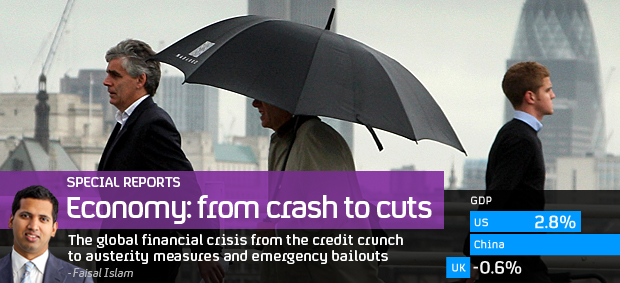Can positive US job growth halt market slide?
As world markets reel from a slump in share prices, crucial US unemployment figures show that job growth in the world’s largest economy accelerated more than expected in July.

117,000 new jobs were created in the United States in July – above market expectations for a gain of 85,000. As a result, US unemployment dipped to 9.1 per cent from 9.2 per cent in June.
Today’s US Labor Department figures buck the recent trend of disappointing economic data from the world’s largest economy.
But the figure may not be enough to calm world markets that have been falling sharply since Thursday afternoon.
“An increase of 200,000 would indicate that there is enough job growth to absorb labour market entrants, so a figure of that magnitude would be helpful,” Dr Linda Yueh, economics correspondent for Bloomberg TV and an Oxford University economics fellow, told Channel 4 News shortly before Friday’s announcement.
There were fears that poor figures could have accelerated a double-dip recession for the US.
“It could influence the present, of course, in terms of confidence, but won’t be the final word on whether the US is headed back into recession,” said Dr Yueh.
Markets spooked
Fears over the US economy, combined with uncertainty over the ability of some eurozone countries to repay their debt, are driving stock market jitters across the globe.
Markets were spooked by the recent disagreement between Democrats and Republicans in the US Congress over the best way to extend the United States’ $14.3bn debt.
Monday’s last-gasp agreement to raise the US debt ceiling has not allayed concerns over the weakness of the American economy.
In Europe, meanwhile, investors are worried about the ability of Spain and Italy to pay off their debts, weeks after a second bailout worth 96bn euros was agreed for Greece.
Problems within the eurozone are compounded by a perceived lack of political unity among participating nations. Critics point to the fact that there is no fiscal authority above nation state level to control policy on the euro.
-
Latest news
-
Taylor Swift’s new break-up album breaks records3m

-
NHS trust fined £200K for failings that led to death of two mental health patients3m

-
Sunak vows to end UK ‘sick note culture’ with benefit reform3m

-
‘Loose talk about using nuclear weapons is irresponsible and unacceptable’, says head of UN’s nuclear watchdog3m

-
‘There wasn’t an Israeli attack on Iran,’ says former adviser to Iran’s nuclear negotiations team7m

-





